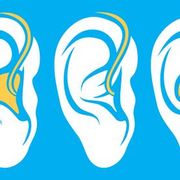What Are the Differences Between Analog & Digital Hearing Aids?

For people with hearing impairments, hearing aids can have a drastic impact on their quality of life. Luckily, technology has advanced quite a bit over the years, and now people can make a selection between analog and digital devices, depending on their needs and preferences. This guide explains the differences between each type of device, so you can make an informed decision.
Analog Hearing Aids
Analog aids take sound waves and turn them into electrical signals. These signals are then amplified by the device, which allows the wearer to better process voices and sounds. Some types amplify all sounds at the same rate, whether a person is speaking to you or you're surrounded by background noise. Others are able to be programmed to operate in different environments. For instance, one setting may be suitable for a noisy restaurant, while another may be suited to a quiet place, such as your home. In order to switch from setting to setting, the wearer usually has to press a button on the device.
Digital Hearing Aids

Instead of turning sound waves into electrical signals, digital devices convert them into numerical digital codes, much like the binary code used by computers. This makes for more complex processing of sounds, as the technology is capable of identifying sounds and amplifying some more than others. For example, the device can focus on sound coming from a certain direction, or it can prioritize one type of sound over another. It can also produce an exact duplication of a sound, which makes it crisper and more precise.
How to Choose the Best Hearing Aid for Your Needs
While both types of hearing devices are effective, digital technology is quickly becoming the standard among audiologists. However, digital aids tend to be more expensive, which means an analog option might be in your best interest if you're working on a tight budget. People with more significant hearing loss are probably better served by digital aids since they're capable of parsing different types of sound. On the other hand, an analog aid can work well for people with less severe hearing loss.
If you're still not sure which hearing aid is best for you, it's time to consult with an audiologist. Turn to Northwest Alabama Hearing Clinic in Hamilton, AL, for comprehensive testing to get to the root of hearing issues. From there, the audiologist can assist patients in finding the best device for their needs and lifestyle. This trusted professional also provides friendly, personalized service to every patient to ensure the best results. Visit the website to learn more about their services, or call (205) 952-9944 to schedule a consultation today.
About the Business
Have a question? Ask the experts!
Send your question

